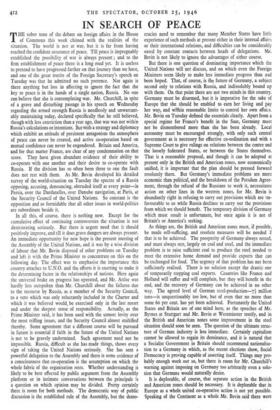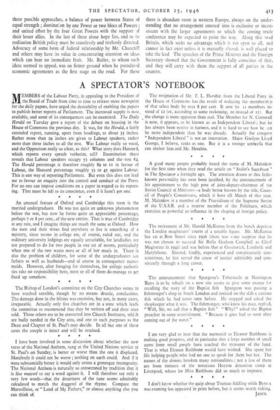IN SEARCH OF PEACE
THE sober tone of the debate on foreign affairs in the House of Commons this week chimed with the realities of the situation. The world is not at war, but it is far from having reached the confident assurance of peace. Till peace is impregnably established the possibility of war is always present ; and to the firm establishment of peace there is a long road yet. It is useless to pretend to have progressed farther on that journey than we have, and one of the great merits of the Foreign Secretary's speech on Tuesday was that he admitted no such pretence. Nor again is there anything but loss in affecting to ignore the fact that the key to peace is in the hands of a single nation, Russia. No one can believe that she is contemplating war. Mr. Churchill, in spite of a grave and disturbing passage in his speech on Wednesday regarding the armed strength Russia is needlessly and unwarrant- ably maintaining today, declared specifically that he still believed, though with less conviction than a year ago, that war was not within Russia's calculations or intentions. But with a strategy and diplomacy which exhibit an attitude of persistent antagonism the atmosphere of peace can never be created, and active co-operation based on mutual confidence can never be engendered. Britain and America, and for that matter France, are clear of any condemnation on that score. They have given abundant evidence of their ability to co-operate with one another and their desire to co-operate with Russia. If the division has so often been three to one the fault does not rest with them. As Mr. Bevin developed his detailed survey of the world-situation on Tuesday the spectre of a Russia opposing, accusing, denouncing, obtruded itself at every point—in Persia, over the Dardanelles, over Danube navigation, at Paris, at the Security Council of the United Nations. So constant is the opposition and so formidable that all other issues in world-politics are subordinate beside it.
In all this, of course, there is nothing new. Except for the cumulative effect of continuing controversies the situation is not deteriorating seriously. But there is urgent need that it should positively improve, and till it does grave dangers are always present. An immediate opportunity for new hope is the present meeting of the Assembly of the United Nations, and it was by a wise division of labour that Mr. Bevin disposed of other problems on Tuesday and left it with the Prime Minister to concentrate on this on the following day. The effect was to emphasise the importance this country attaches to U.N.O. and the efforts it is exerting to make it the determining factor in the relationships of nations. Here again the universal brake on progress- has operated, and Mr. Attlee was hardly less outspoken than Mr. Churchill about the failures due to the recourse by Russia, as a member of the Security Council, to a veto which was only reluctantly included in the Charter and which it was believed would, be exercised only in the last resort and under the deepest sense of responsibility. Actually, as the Prime Minister said, it has been used with the utmost levity over the most trifling issues, and the Security Council almost stultified thereby. Some agreement that a different course will be pursued in future is essential if faith in the future of the United Nations is not to be gravely undermined. Such agreement need not be impossible. Russia, difficult as she has made things, shows every sign of taking the United Nations seriously. She has sent a powerful delegation to the Assembly and there is some evidence of a consciousness that co-operation is the assumption on which the whole fabric of the organisation rests. Whether understanding is likely to be best effected by public argument from the Assembly platform or in intimate conversations between the principals is a question on which opinion may be divided. Pretty certainly there is room for both methods. The democratic way of public discussion is the established rule of the Assembly, but the demo- cracies need to remember that many Member States have little experience of such methods at present either in their internal affairs or their international relations, and difficulties can be considerably eased by constant contacts between heads of delegations. Mr. Bevin is not likely to ignore the advantages of either course.
But there is one question of dominating importance which the United Nations will not discuss, and on which even the Foreign Ministers seem likely to make less immediate progress than nad been hoped. That, of course, is the future of Germany, a subject second only to relations with Russia, and indissolubly bound up with them. On that point there are not two minds in this country. Germany must be disarmed, but it is imperative for the sake of Europe that she should be enabled to earn her living and pay her way, and wilhin reasonable limits to control her own affairs. Mr. Bevin on Tuesday defined the essentials clearly. Apart from a special regime for France's benefit in the Saar, Germany must not be dismembered more than she has been already. Local autonomy must be encouraged strongly, with only such central government as is necessary for effective co-ordination and with a Supreme Court to give rulings on relations between the centre and the loosely federated States, or between the States themselves. That is a reasonable proposal, and though it can be adopted at present only in the British and American zones, now economically unified, it is important that the plan should be pressed forward resolutely there. But Germany's immediate problems are more economic than political, and the breakdown of the Potsdam Agree- ment, through the refusal of the Russians to work it, necessitates action on other lines in the western zones, for Mr. Bevin is abundantly right in refusing to carry out provisions which are un- favourable to us while Russia declines to carry out the provisions from which we should benefit. The temporary division of Germany which must result is unfortunate, but once again it is not of Britain's or America's seeking.
As things are, the British and American zones must, if possible, be made self-sufficing, and resolute measures will be needed that is to be achieved. The prosperity of Germany always rested, and must always rest, largely on coal and steel, and the immediate problem is to raise sufficient coal to produce the steel, needed to meet the extensive home demand and provide exports that can be exchanged for food. The urgency of that problem has not been sufficiently realised. There is no solution except the drastic one of temporarily stopping coal exports. Countries like France and Holland will suffer and will complain, but they will benefit in the end, and_ the recovery of Germany can be achieved in no other way. The agreed level of German steel-production-71 million tons—is unquestionably too. low, but of even that no more than some 6o per cent. has yet been achieved. Fortunately the United States and Britain are of one mind here, as the speeches of Mr. Byrnes at Stuttgart and Mr. Bevin at Westminster testify, and in the British and American zones some improvement in the steel situation should soon be seen. The question of the ultimate struc- ture of German industry is less immediate. Certainly capitalism cannot be allowed to regain its dominance, and it is natural that a Socialist Government in Britain should recommend nationalisa- tion to a Germany in which, as the recent elections show, Social Democracy is proving capable of asserting itself. Things may pro- bably enough work out so, but there is room for Mr. Churchill's warning against imposing on Germany too arbitrarily even a solu- tion that Germans would naturally desire.
It is deplorable, of course, that separate action in the British and American zones should be necessary. It is deplorable that in Europe as a whole united co-operative action is not yet possible. Speaking of the Continent as a whole Mr. Bevin said there were three possible approaches, a balance of power between States of equal strength ; dominat:on by one Power or two blocs of Powers ; and united effort by the four Great Powers with the support of their lesser allies. In the last of these alone hope lies, and to its realisation British policy must be ceaselessly and tirelessly directed. Advocacy of some form of federal relationship by Mr. Churchill and others may have its value in concentrating attention on ideas which can bear no immediate fruit. Mr. Butler, to whom such ideas seemed to appeal, was on firmer ground when he postulated economic agreements as the first stage on the road. For these there is abundant room in western Europe, always on the under- standing that no arrangement entered into is exclusive or incon- sistent with the larger agreements to which the coming trade conference may be expected to point the way. Along this road Britain, which seeks no advantage which is not open to all, and cannot in fact exist unless it is mutually shared, is well placed to take the lead The speeches of the Prime Minister and the Foreign Secretary showed that the Government is fully conscious of that, and they will carry with them the support of all parties in the country.































 Previous page
Previous page